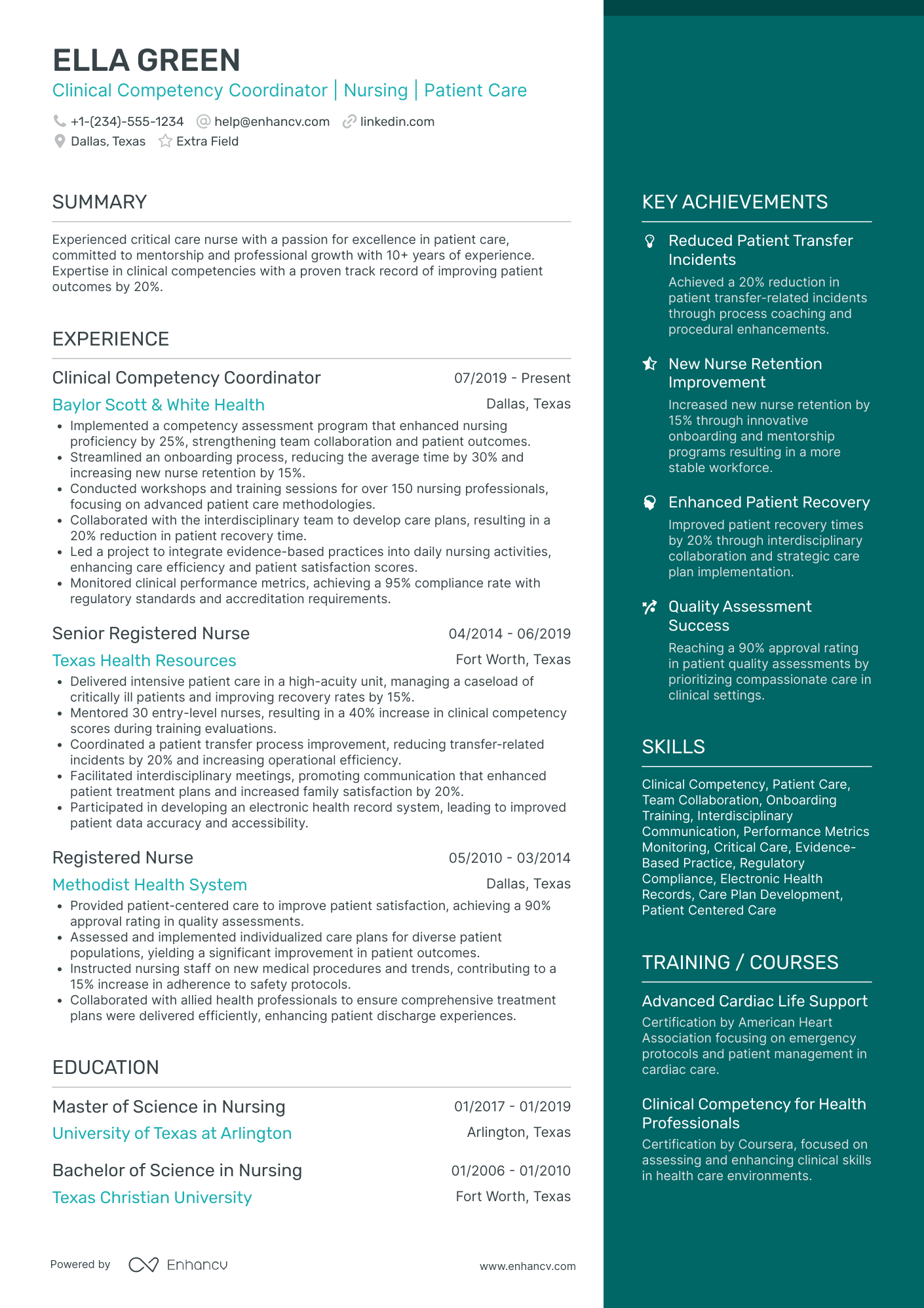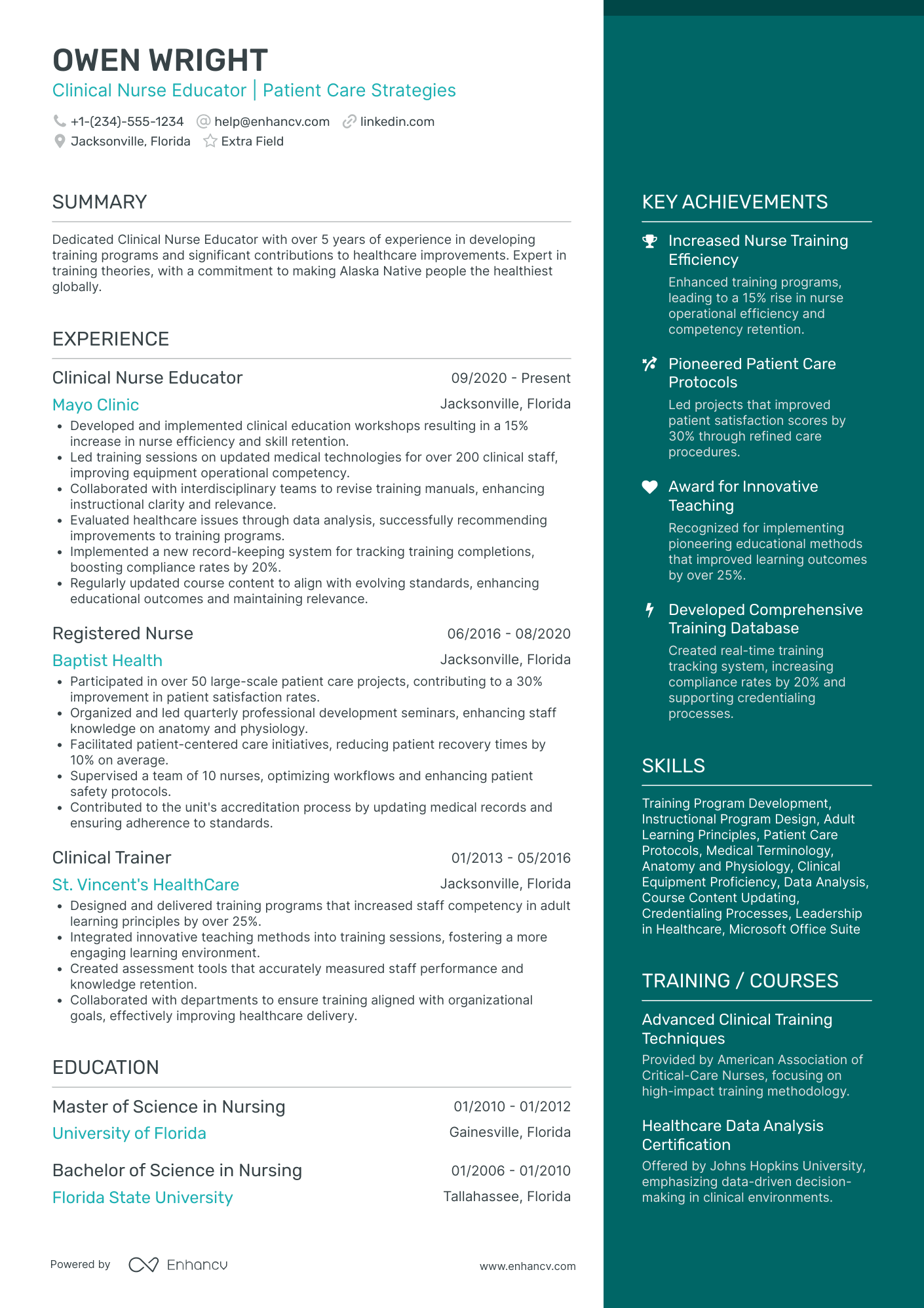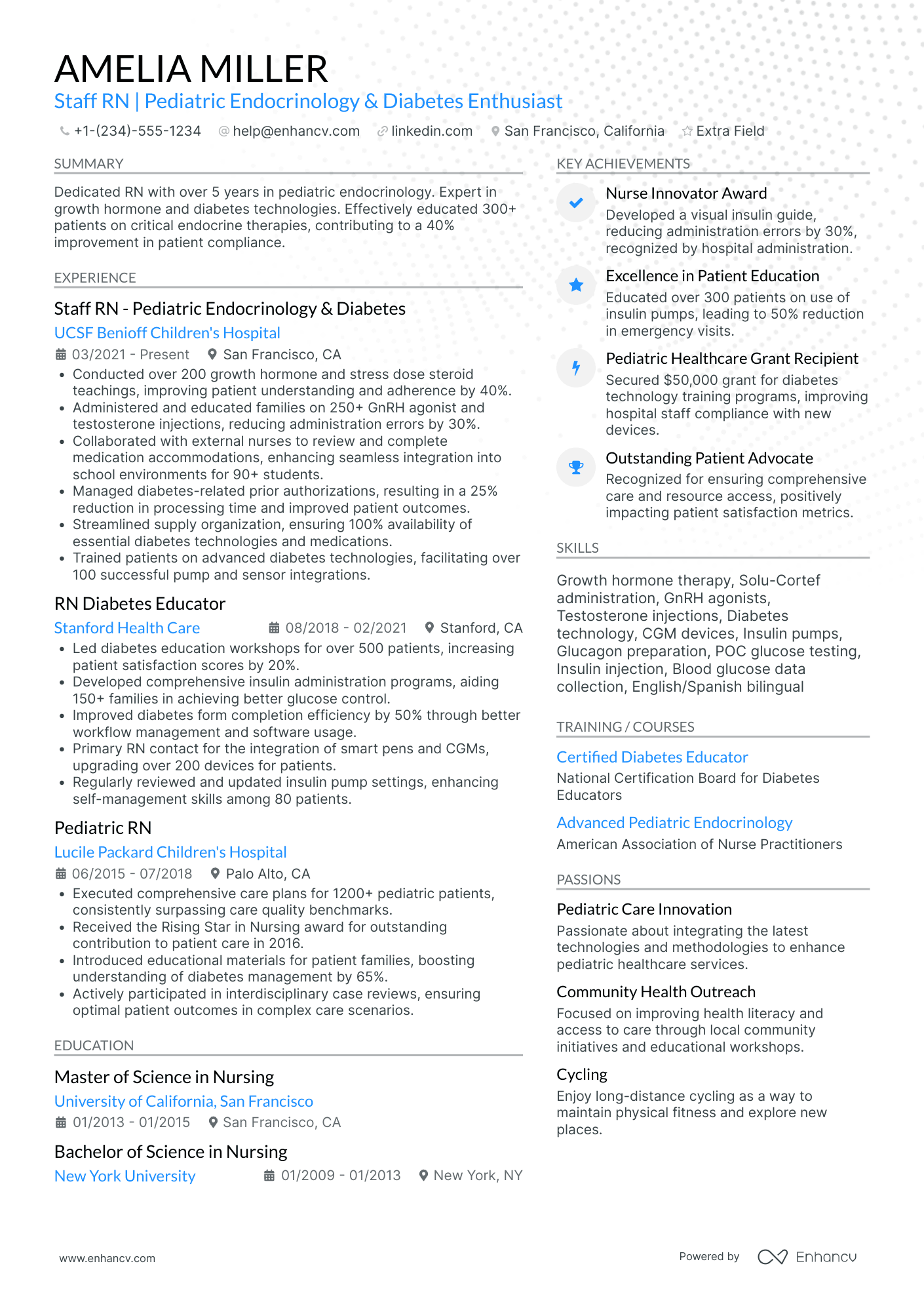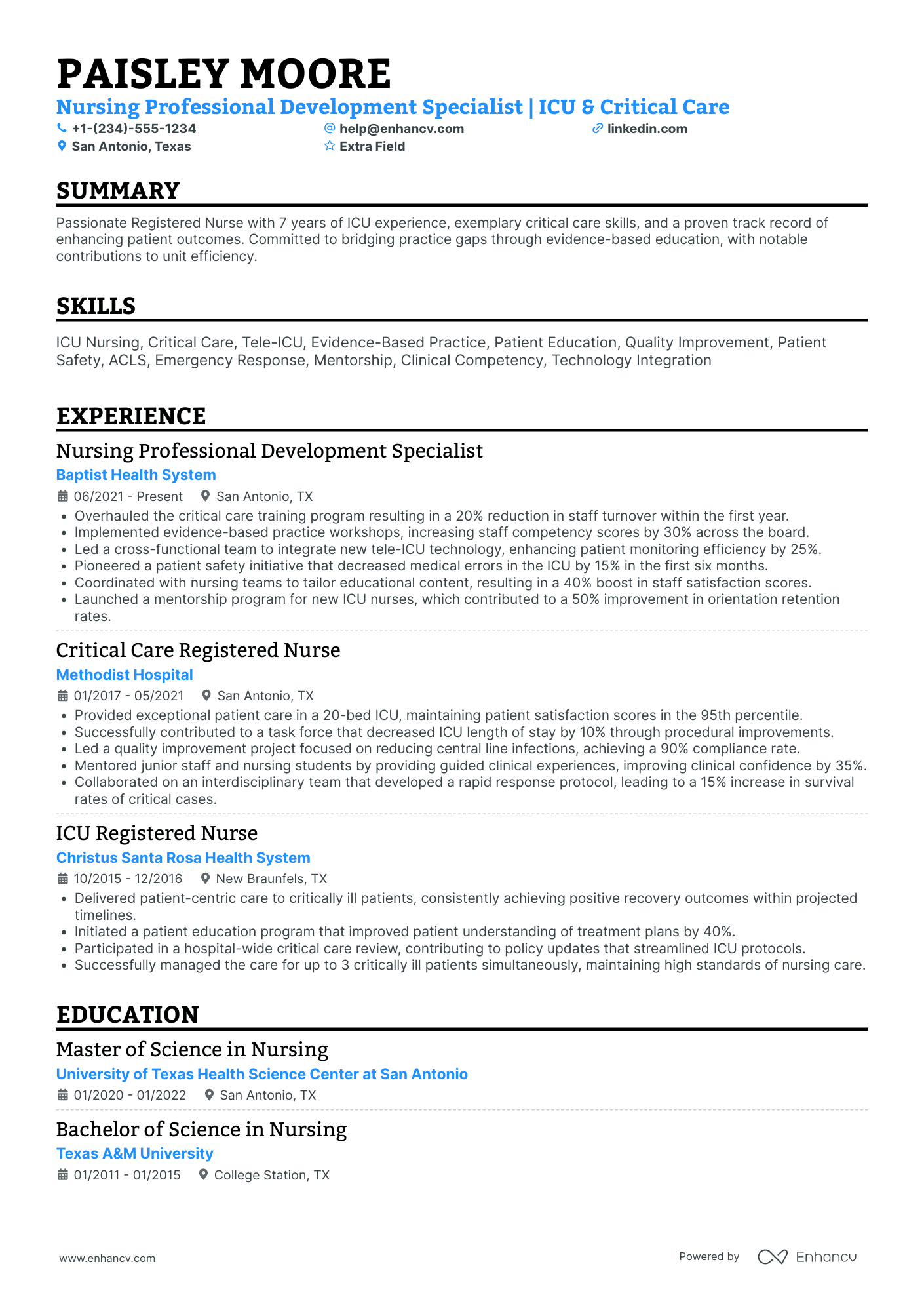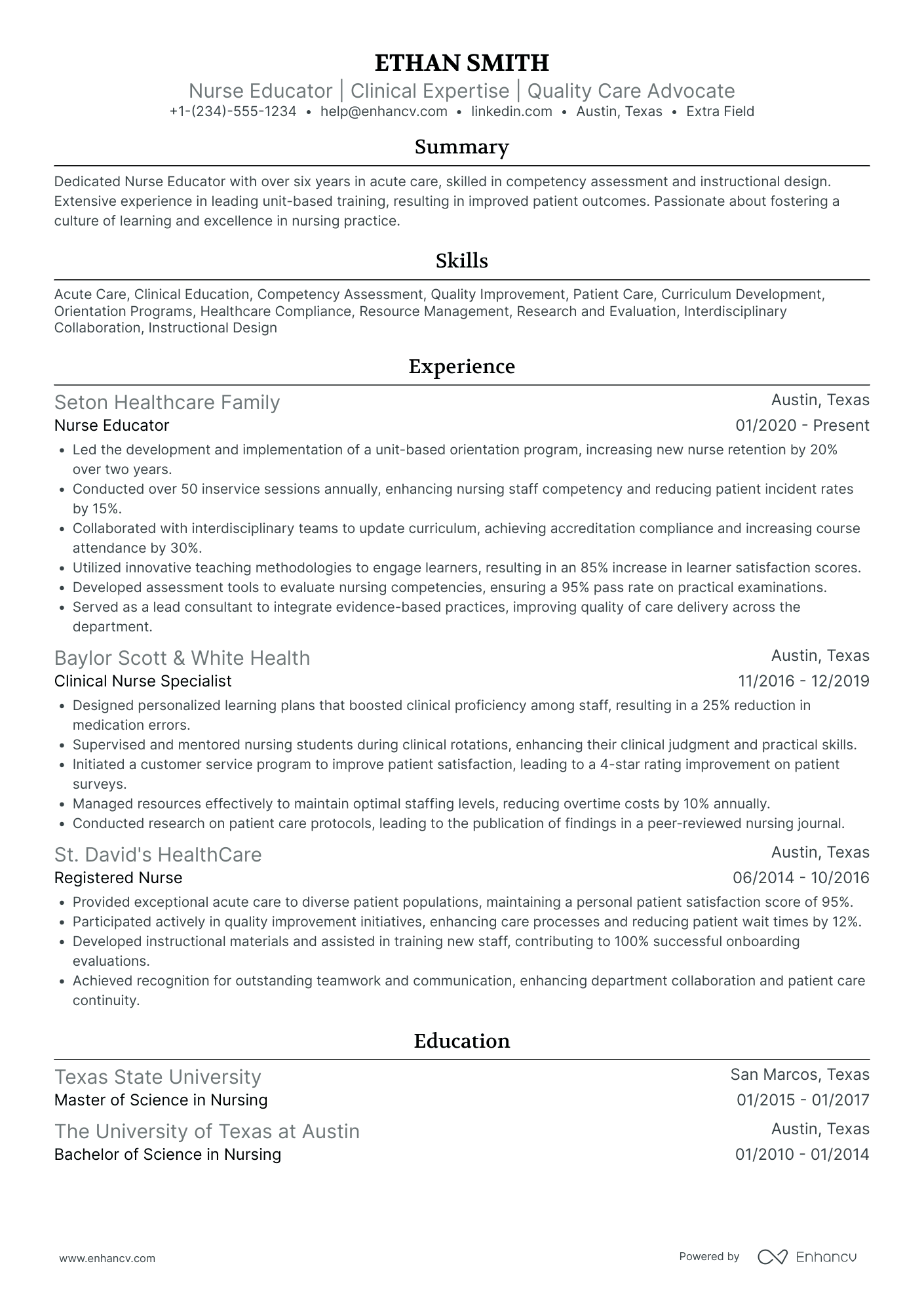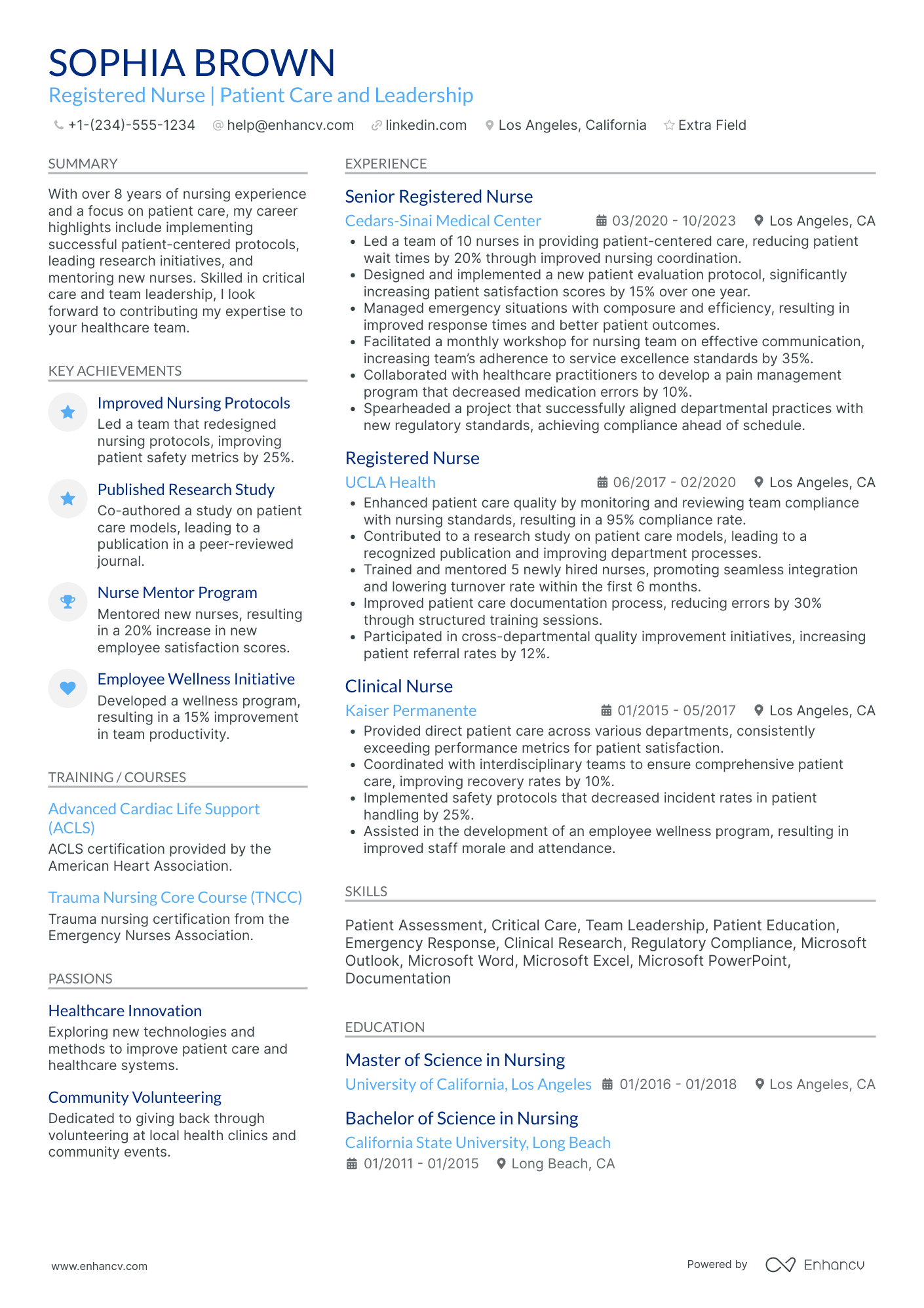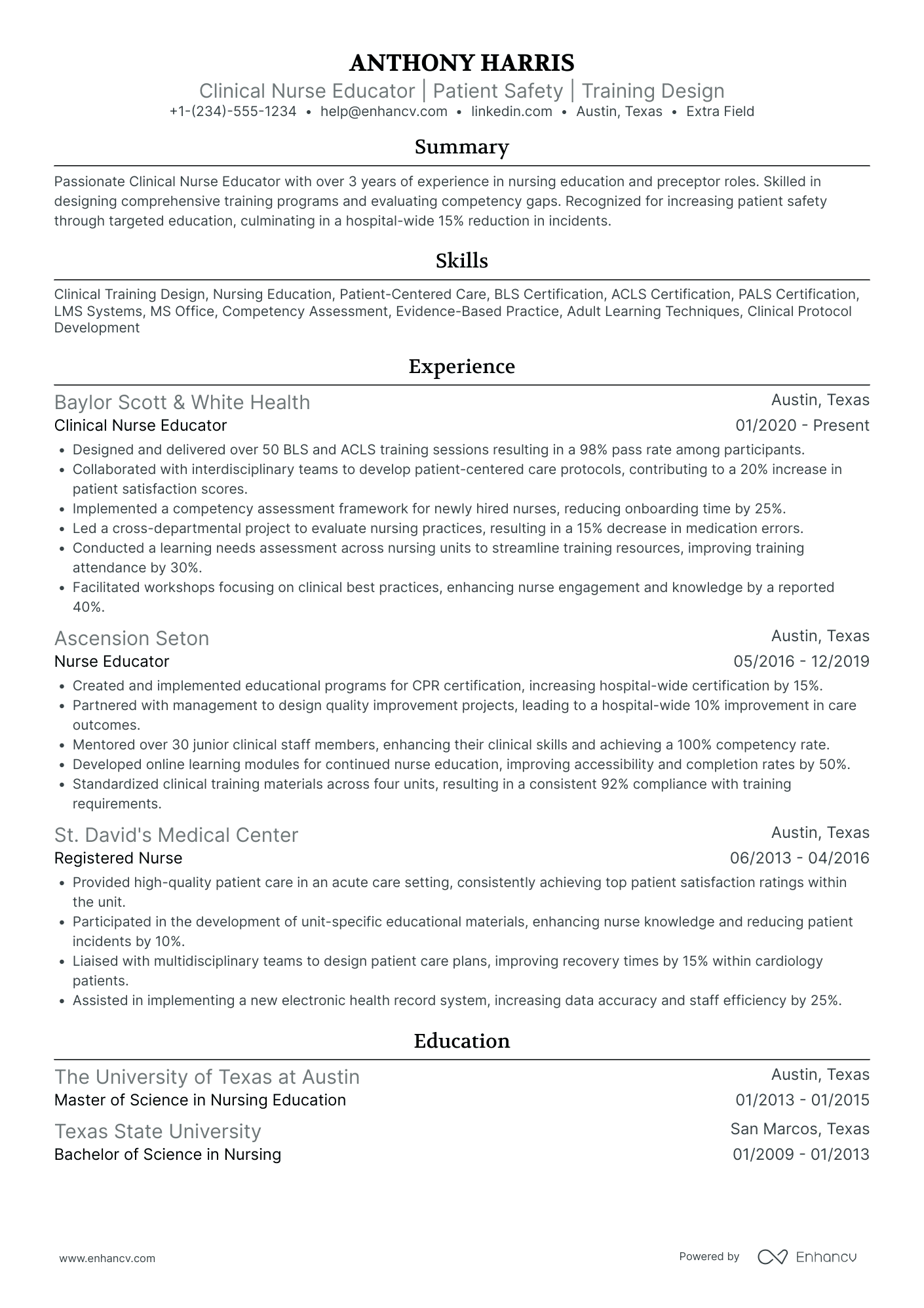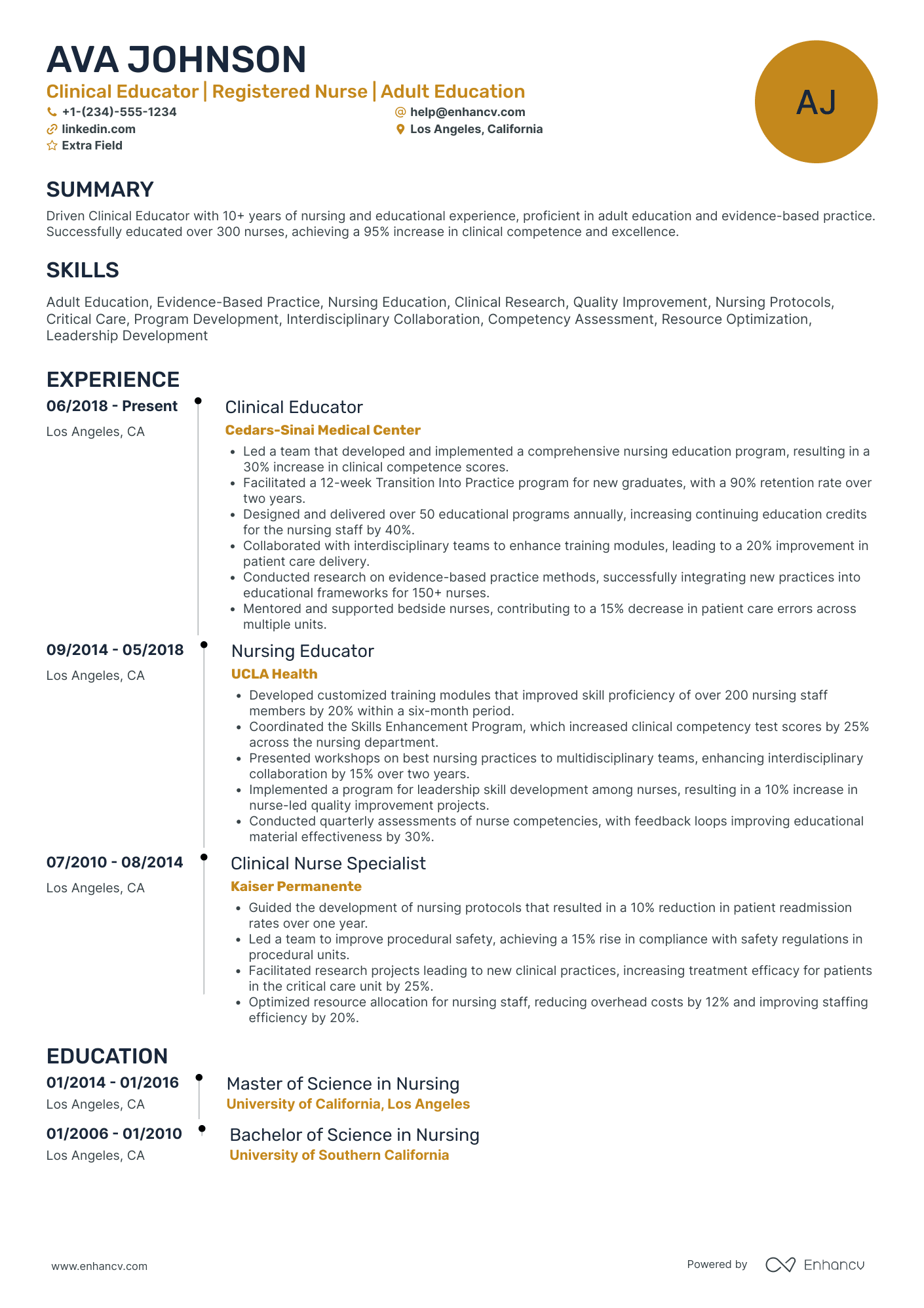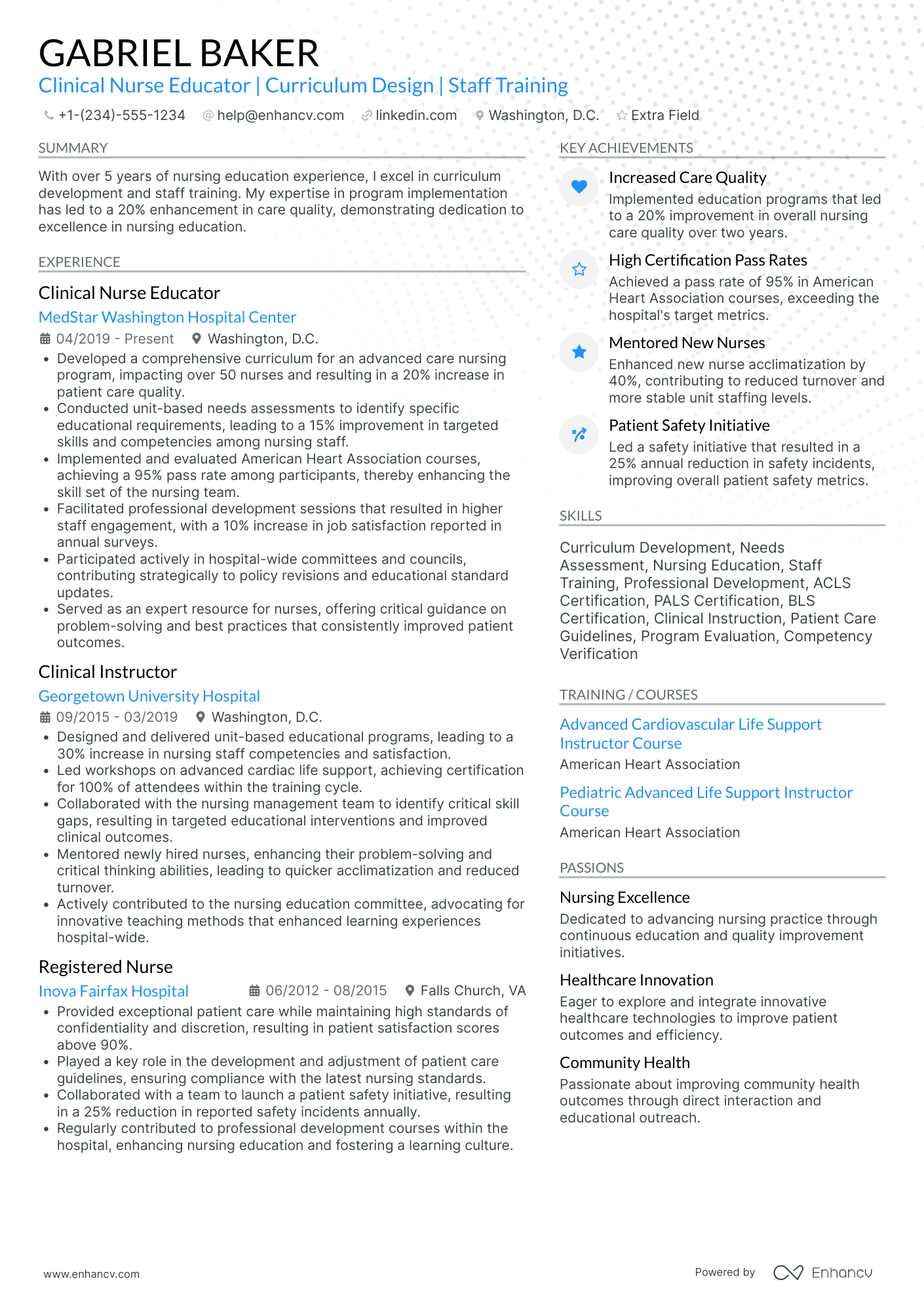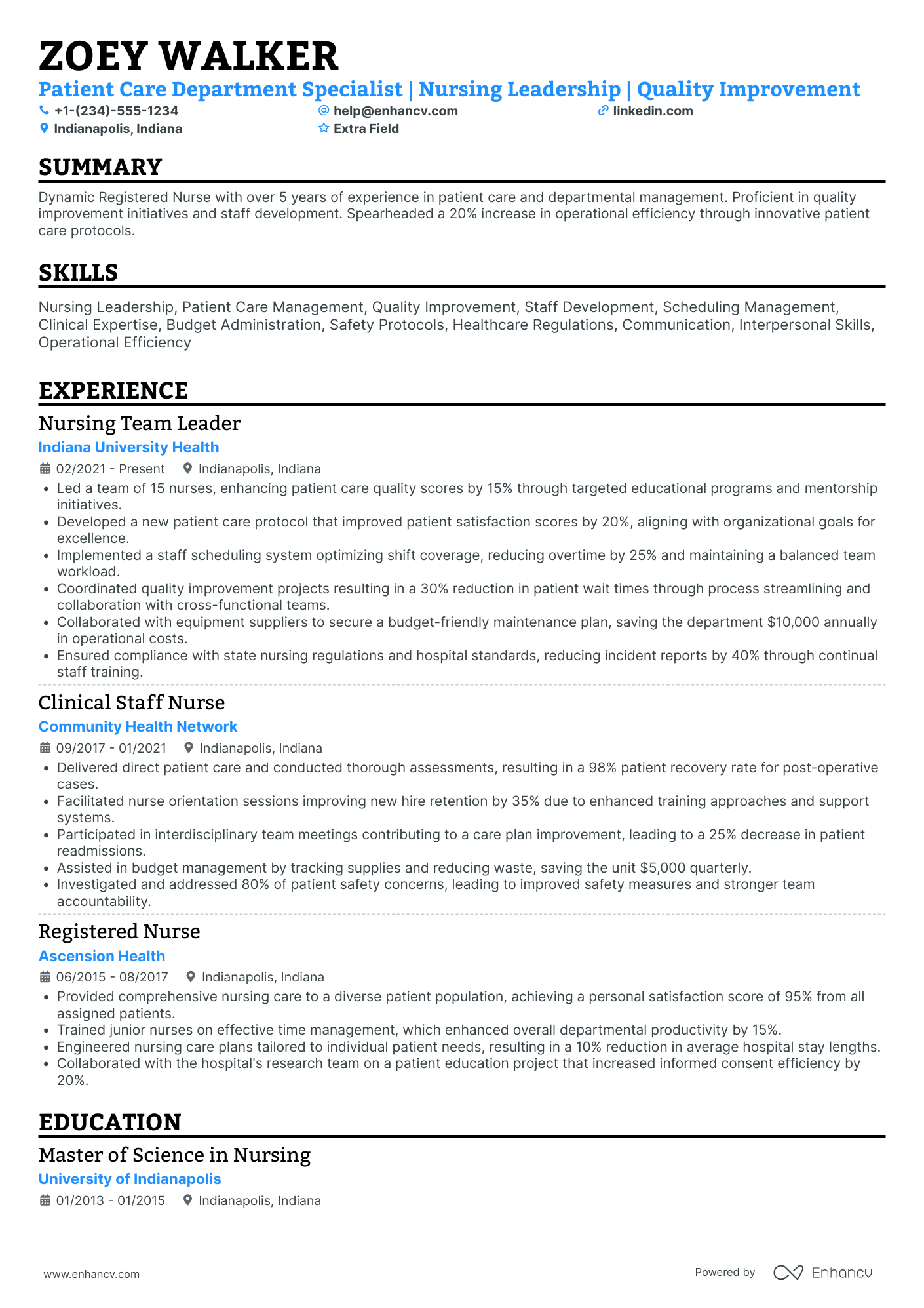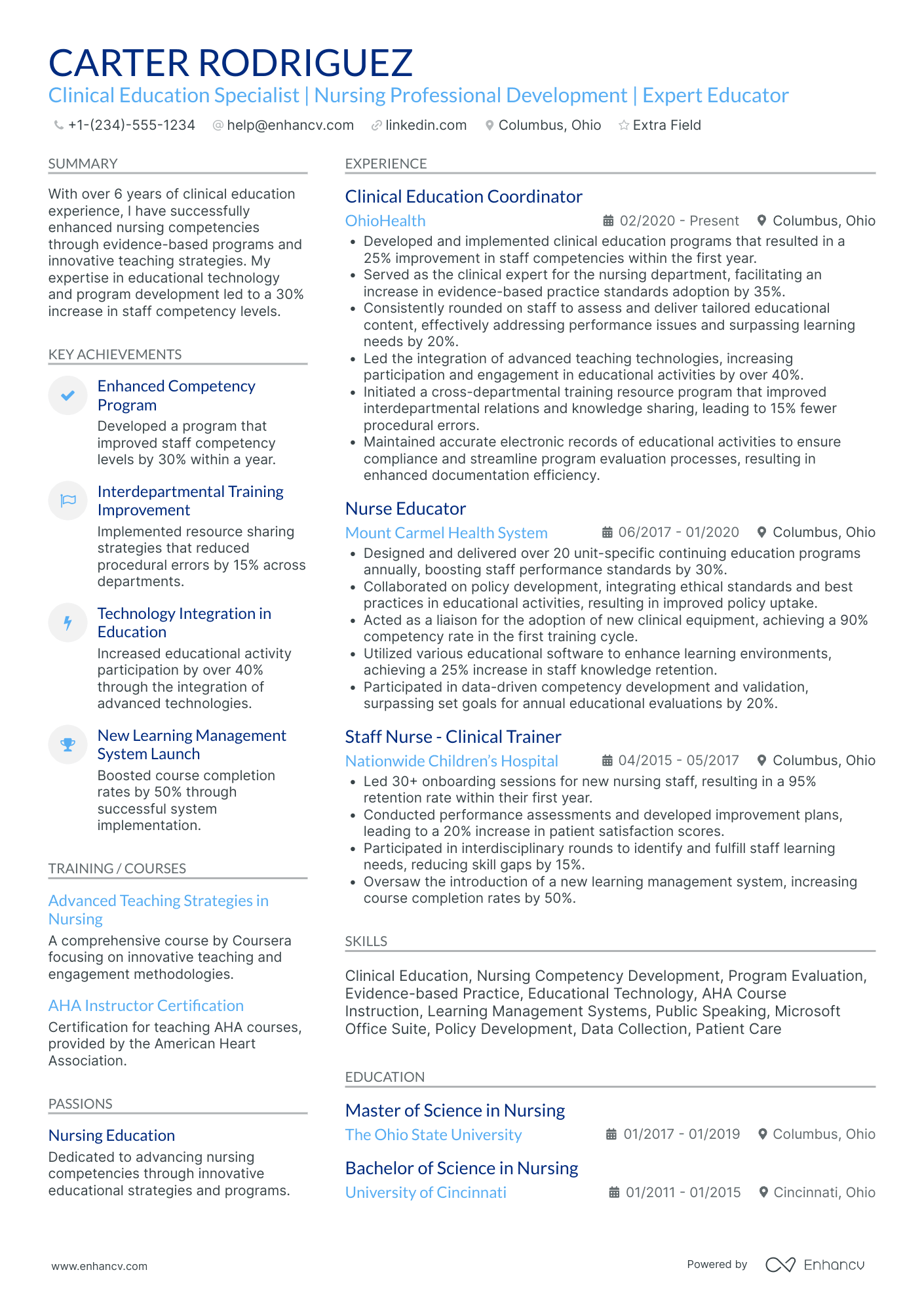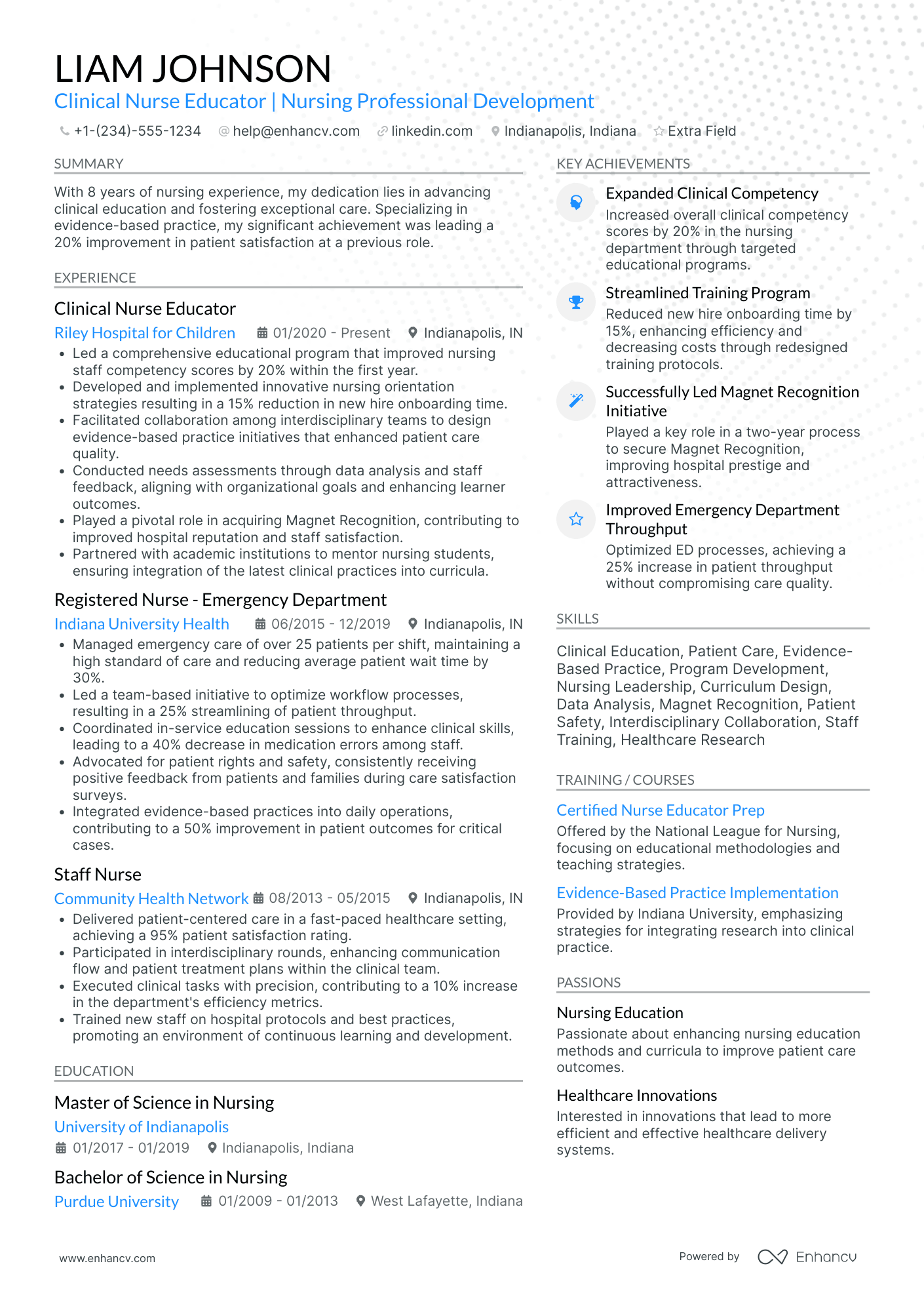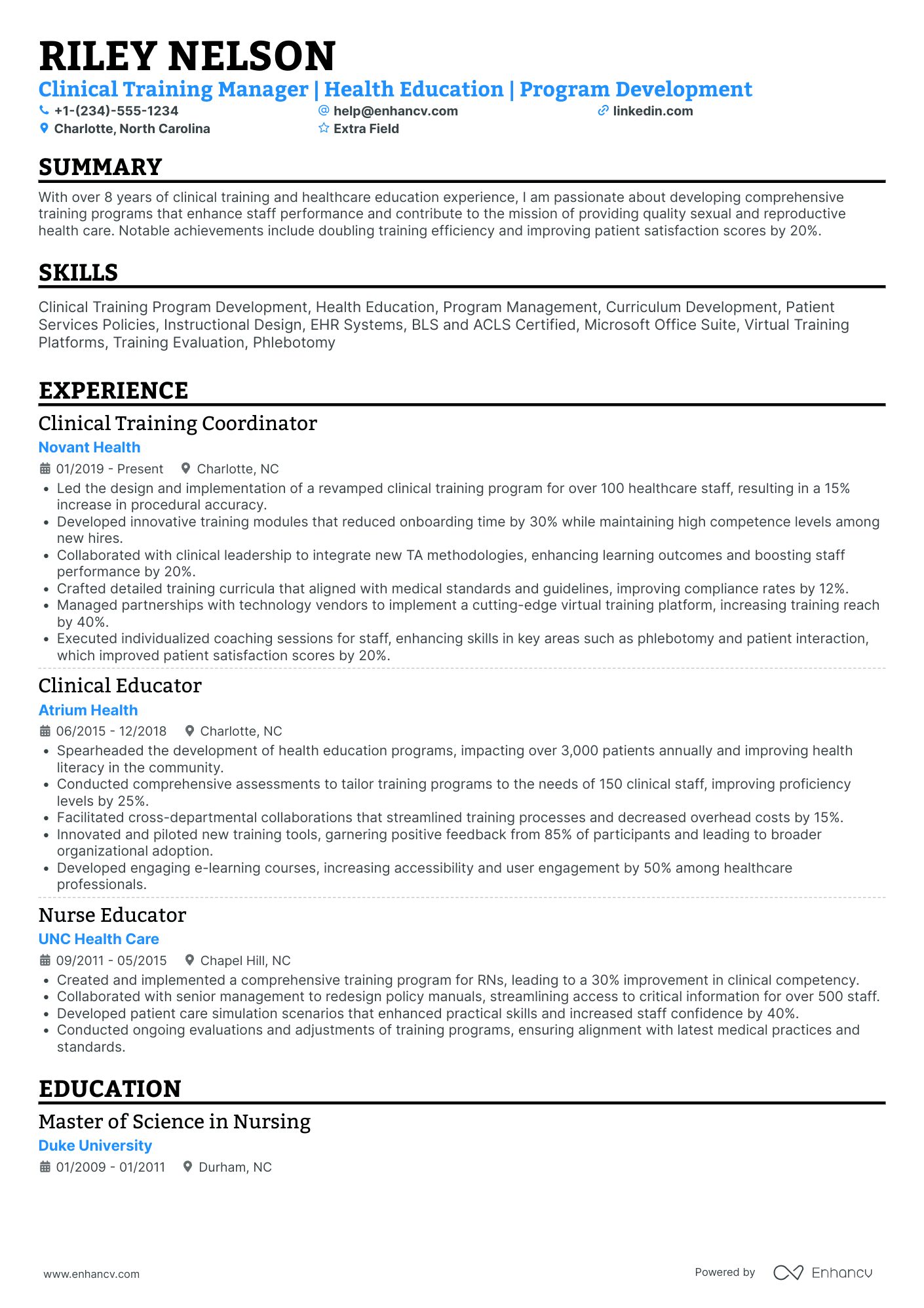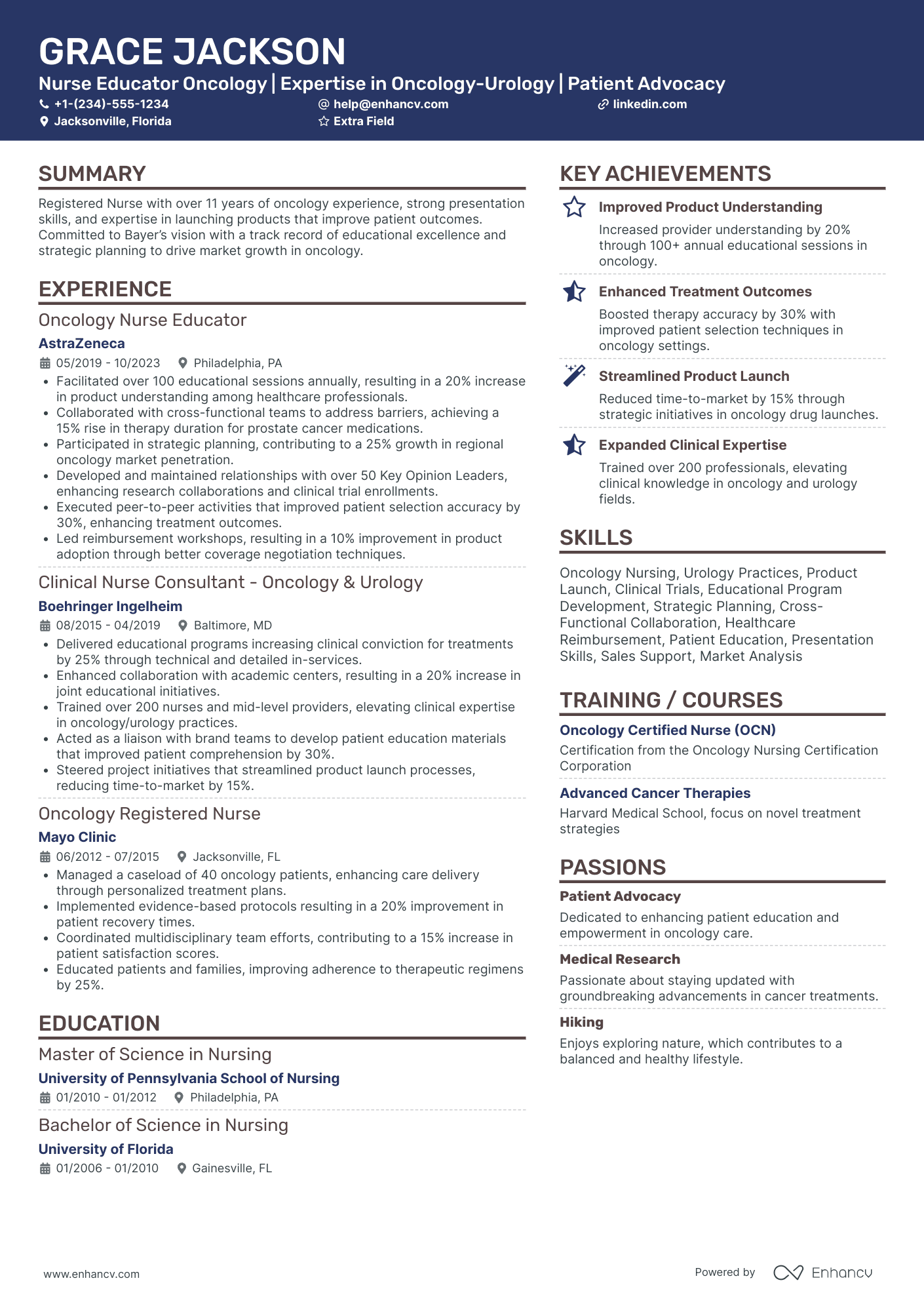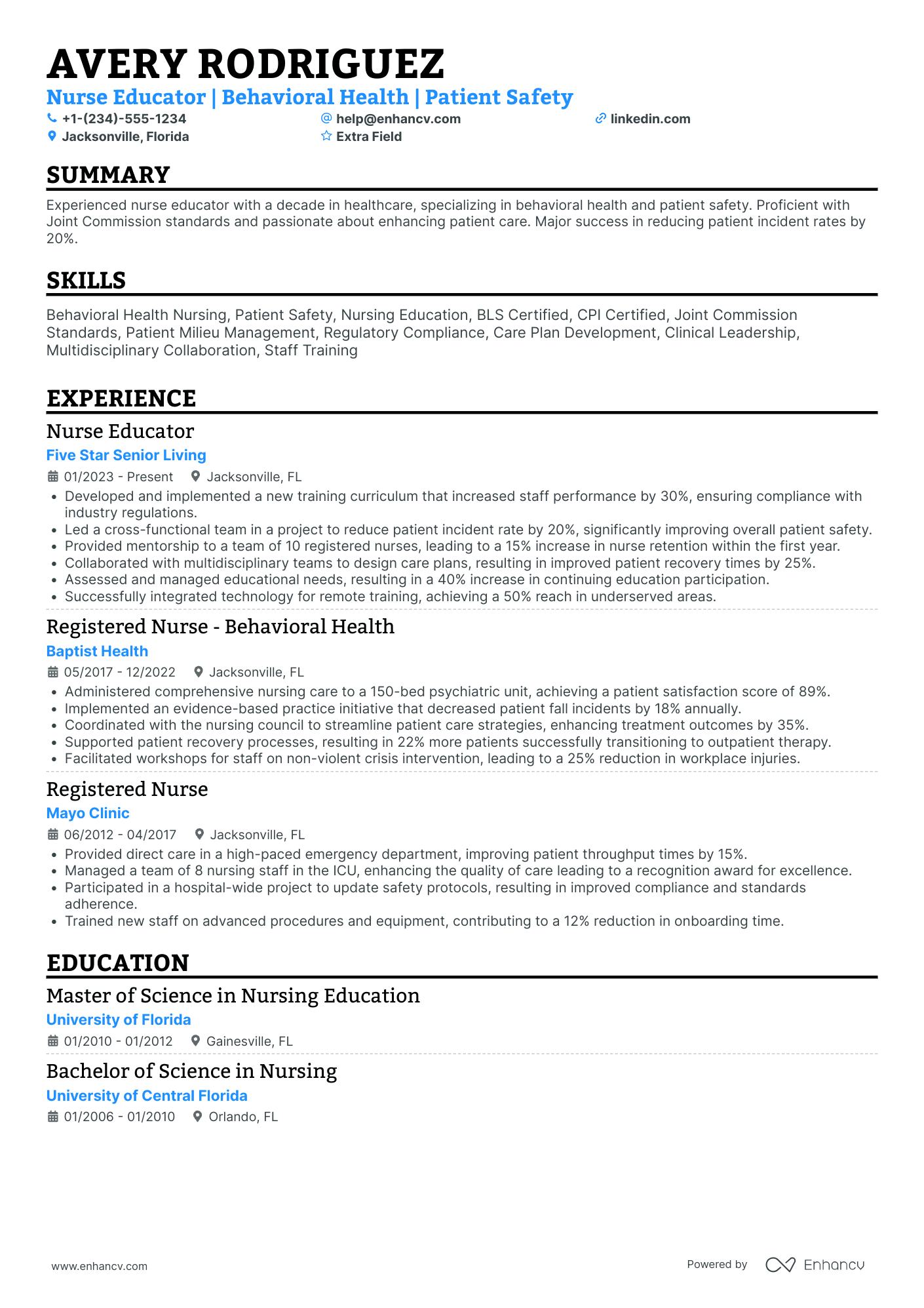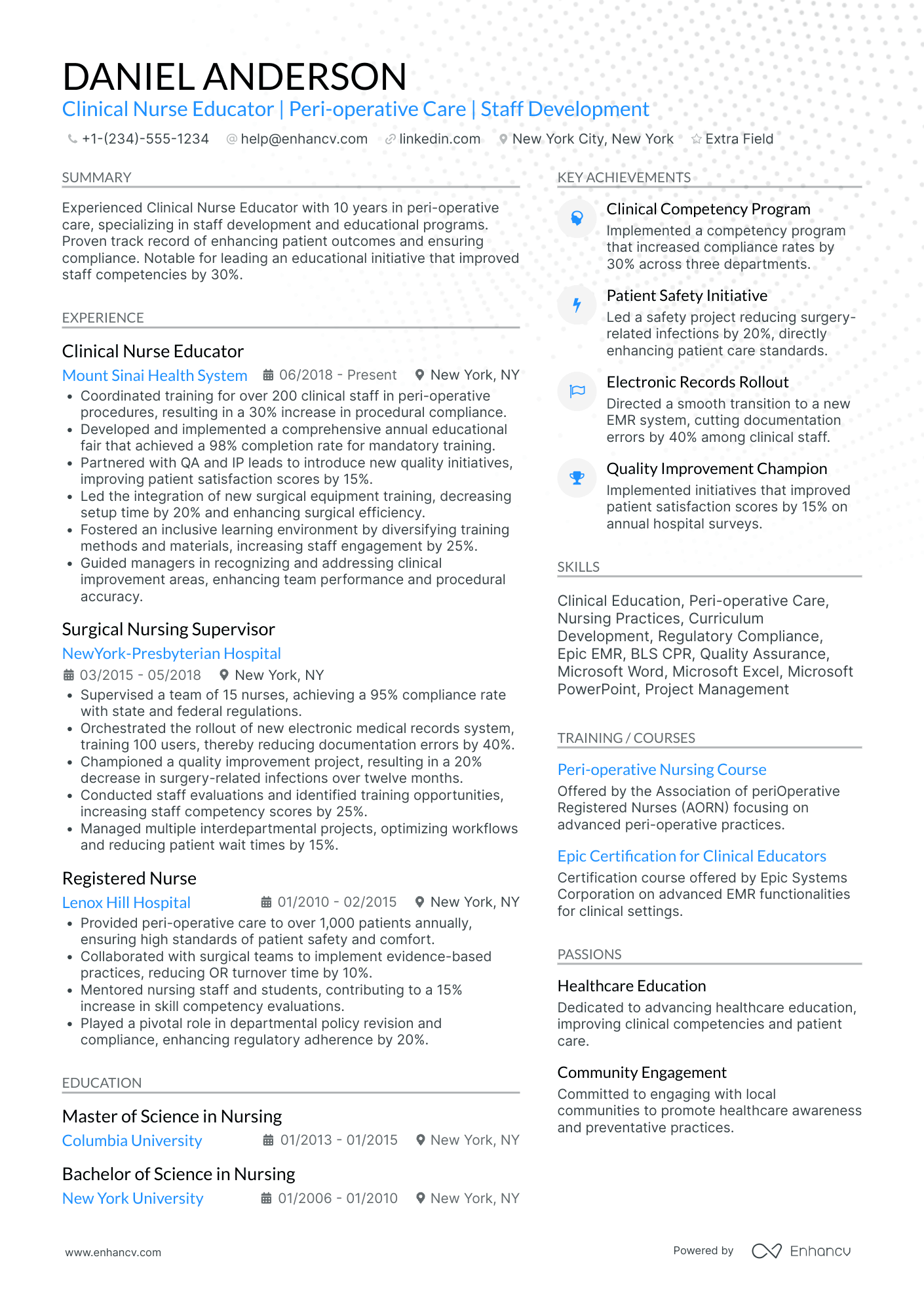You may find it challenging to effectively showcase your extensive clinical experience and teaching accomplishments on a single resume. Our guide offers strategies tailored to nurse educators like you, helping to highlight your qualifications and convey your educational expertise in a concise, impactful manner.
- Utilize real-life examples to refine your nurse educator resume;
- Effectively write the experience section of your nurse educator resume, even if you have minimal or no professional experience;
- Incorporate the industry's top 10 essential skills throughout your resume;
- Include your education and certifications to highlight your specific expertise.
If the nurse educator resume isn't the right one for you, take a look at other related guides we have:
Designing your nurse educator resume format to catch recruiters' eyes
Your nurse educator resume will be assessed on a couple of criteria, one of which is the actual presentation.
Is your resume legible and organized? Does it follow a smooth flow?
Or have you presented recruiters with a chaotic document that includes everything you've ever done in your career?
Unless specified otherwise, there are four best practices to help maintain your resume format consistency.
- The top one third of your nurse educator resume should definitely include a header, so that recruiters can easily contact you and scan your professional portfolio (or LinkedIn profile).
- Within the experience section, list your most recent (and relevant) role first, followed up with the rest of your career history in a reverse-chronological resume format .
- Always submit your resume as a PDF file to sustain its layout. There are some rare exceptions where companies may ask you to forward your resume in Word or another format.
- If you are applying for a more senior role and have over a decade of applicable work experience (that will impress recruiters), then your nurse educator resume can be two pages long. Otherwise, your resume shouldn't be longer than a single page.
Align your resume with the market’s standards – Canadian resumes may have unique layout guidelines.
Upload & Check Your Resume
Drop your resume here or choose a file. PDF & DOCX only. Max 2MB file size.
PRO TIP
Highlight any significant extracurricular activities that demonstrate valuable skills or leadership.
Recruiters' preferred nurse educator resume sections:
- A header with relevant contact information and headline, listing your current job title
- A resume summary or objective pinpointing what is most impressive about your expertise (that aligns with the role)
- An experience section highlighting the specifics of your responsibilities and achievements
- A skills sidebar to intertwine job advert keywords with your unique talents
- An education and certifications sections to serve as further accreditation to your professional experience
What recruiters want to see on your resume:
- Demonstrated expertise in clinical nursing skills and evidence-based practice.
- Experience in designing, implementing, and evaluating nursing education programs and curricula.
- Proficiency in teaching methods and strategies suitable for a diverse range of learning styles and environments.
- Strong background in student assessment, mentorship, and providing constructive feedback to advance nursing competency.
- Active nursing license and relevant certifications reflecting specialty areas and teaching qualifications.
Adding your relevant experience to your nurse educator resume
If you're looking for a way to show recruiters that your expertise is credible, look no further than the resume experience section.
Your nurse educator resume experience can be best curated in a structured, bulleted list detailing the particulars of your career:
- Always integrate metrics of success - what did you actually achieve in the role?
- Scan the nurse educator advert for your dream role in search of keywords in the job requirements - feature those all through your past/current experience;
- Dedicate a bullet (or two) to spotlight your technical capabilities and how you're able to use the particular software/technology in your day-to-day roles;
- Write simple by including your responsibility, a job advert keyword or skill, and a tangible outcome of your success;
- Use the experience section to also define the unique value of working with you in the form of soft skills, relevant feedback, and the company culture you best thrive in.
Industry leaders always ensure that their resume experience section offers an enticing glimpse at their expertise, while telling a career narrative. Explore these sample nurse educator resumes on how to best create your resume experience section.
- Developed a comprehensive 12-week pedagogy program for new nurse educators that improved teaching strategies by 30%, enhancing student engagement and comprehension.
- Facilitated interdisciplinary workshops across clinical and academic teams, driving the adoption of evidence-based practices in patient care and nursing education.
- Pioneered the use of simulation-based learning in the nursing curriculum, which resulted in a 25% increase in clinical competency among graduating students.
- Directed the design and delivery of a diabetes management continuing education series that reached over 500 nurses, improving patient HbA1c levels by 1.5 on average.
- Implemented a peer-mentoring program that decreased turnover rates by 20% and fostered a supportive learning environment within the nursing staff.
- Successfully acquired $50,000 in grant funding to support ongoing nurse training programs, enhancing the hospital's resource allocation for professional development.
- Collaborated with nurse managers to identify educational deficits, resulting in customized training modules that increased nursing staff competencies by 35%.
- Analyzed data from patient outcomes to refine nurse training content, leading to a 10% reduction in medication errors hospital-wide.
- Championed the integration of technology in the nursing curriculum, including the introduction of an e-learning platform that accommodated 800+ nurses and streamlined the learning process.
- Orchestrated an annual nursing symposium focusing on patient safety that attracted over 250 nurses and healthcare professionals each year.
- Conducted research on effective teaching methodologies in clinical settings and incorporated findings to revamp existing educational materials.
- Created a mentorship program pairing experienced nurses with recent nursing graduates, which bolstered new nurse retention by 15%.
- Launched a mobile learning initiative for continuing nurse education, providing accessible training options and contributing to a 20% increase in course completions.
- Restructured the critical care nursing orientation program, leading to a standardized training process that reduced onboarding time by an average of 7 days.
- Engaged in community outreach programs to educate public health workers, enhancing the bridge between hospital care and community health services.
- Overhauled the cardiac care nursing module incorporating the latest ECC guidelines which significantly increased adherence to life-saving protocols.
- Led a team of nurse educators in creating interactive case studies, which were instrumental in developing critical thinking skills for emergency response scenarios.
- Curated a comprehensive digital resource library that improved nurse accessibility to up-to-date information, supporting continual professional development.
- Implemented an evidence-based practice fellowship for nursing staff which resulted in the implementation of 10+ quality improvement projects hospital-wide.
- Established a partnership with a local university, leading to the integration of advanced nursing students into the hospital's clinical education programs.
- Provided leadership in transitioning to virtual simulation training in response to the COVID-19 pandemic, ensuring uninterrupted nurse education.
- Delivered targeted educational interventions to nursing staff in the oncology department, raising the quality of patient education on treatment side effects by 40%.
- Coordinated with IT specialists to develop a proprietary app for nurse training, reducing administrative time for educators by 25%.
- Facilitated a collaborative learning environment through the establishment of interdepartmental study groups, promoting cross-functional knowledge sharing.
The following content includes information from "O*NET OnLine" by the U.S. Department of Labor, Employment and Training Administration (USDOL/ETA). Used under the CC BY 4.0 license. The data represents the top responsibilities present on the task lists for nurse educator professionals.
Top Responsibilities for Nurse Educator:
- Prepare and distribute health education materials, such as reports, bulletins, and visual aids, to address smoking, vaccines, and other public health concerns.
- Develop and maintain cooperative working relationships with agencies and organizations interested in public health care.
- Maintain databases, mailing lists, telephone networks, and other information to facilitate the functioning of health education programs.
- Document activities and record information, such as the numbers of applications completed, presentations conducted, and persons assisted.
- Develop and present health education and promotion programs, such as training workshops, conferences, and school or community presentations.
- Collaborate with health specialists and civic groups to determine community health needs and the availability of services and to develop goals for meeting needs.
- Develop, conduct, or coordinate health needs assessments and other public health surveys.
- Supervise professional and technical staff in implementing health programs, objectives, and goals.
- Develop operational plans and policies necessary to achieve health education objectives and services.
- Provide program information to the public by preparing and presenting press releases, conducting media campaigns, or maintaining program-related Web sites.
Quantifying impact on your resume
- Include the number of nursing staff you have successfully trained and mentored to demonstrate your teaching effectiveness.
- List the percentages of exam pass rates for students under your instruction to highlight educational outcomes.
- Specify the amount of educational content you have developed, such as courses or modules, to showcase your expertise.
- Mention the average rating on feedback surveys from trainees to quantify satisfaction and your ability to engage.
- Record the number of presentations or workshops you have delivered to exhibit your communication skills.
- Detail the amount of grant funding you have secured for educational projects to emphasize your ability to acquire resources.
- State the number of continuing education credits you have contributed to, demonstrating commitment to ongoing professional development.
- Quantify the reduction in clinical errors or improvement in patient outcomes as a result of your educational interventions to show real-world impact.
Action verbs for your nurse educator resume
Guide for nurse educator professionals kicking off their career
Who says you can't get that nurse educator job, even though you may not have that much or any experience? Hiring managers have a tendency to hire the out-of-the-blue candidate if they see role alignment. You can show them why you're the best candidate out there by:
- Selecting the functional skill-based or hybrid formats to spotlight your unique value as a professional
- Tailoring your nurse educator resume to always include the most important requirements, found towards the top of the job ad
- Substituting the lack of experience with other relevant sections like achievements, projects, and research
- Pinpoint both achievements and how you see yourself within this specific role in the nurse educator resume objective.
Recommended reads:
PRO TIP
Listing your relevant degrees or certificates on your nurse educator resume is a win-win situation. Not only does it hint at your technical capabilities in the industry, but an array of soft skills, like perseverance, adaptability, and motivation.
Featuring your hard skills and soft skills on your nurse educator resume
The skills section of your nurse educator resume needs to your various capabilities that align with the job requirements. List hard skills (or technical skills) to showcase to potential employers that you're perfectly apt at dealing with technological innovations and niche software. Meanwhile, your soft skills need to detail how you'd thrive within your new, potential environment with personal skills (e.g. resilience, negotiation, organization, etc.) Your nurse educator resume skills section needs to include both types of skills to promote how you're both technical and cultural fit. Here's how to create your bespoke nurse educator skills section to help you stand out:
- Focus on skill requirements that are listed toward the top of the job advert.
- Include niche skills that you've worked hard to obtain.
- Select specific soft skills that match the company (or the department) culture.
- Cover some of the basic job requirements by including important skills for the nurse educator role - ones you haven't been able to list through the rest of your resume.
Get inspired with our nurse educator sample skill list to list some of the most prominent hard and soft skills across the field.
Top skills for your nurse educator resume:
Clinical Simulation Technology
Learning Management Systems (LMS)
Patient Care Technologies
Electronic Health Records (EHR)
Assessment Tools and Techniques
Curriculum Development Software
Statistical Analysis Software
Patient Education Materials Development
Telehealth Platforms
Nursing Informatics
Communication
Empathy
Leadership
Critical Thinking
Adaptability
Collaboration
Time Management
Conflict Resolution
Mentoring
Presentation Skills
Next, you will find information on the top technologies for nurse educator professonals from "O*NET OnLine" by the U.S. Department of Labor, Employment and Training Administration (USDOL/ETA). Used under the CC BY 4.0 license.
Top technologies for Nurse Educator’s resume:
- Blackboard software
- Microsoft Access
- Blogging software
- Adobe Photoshop
- JamBoard
PRO TIP
If you failed to obtain one of the certificates, as listed in the requirements, but decide to include it on your resume, make sure to include a note somewhere that you have the "relevant training, but are planning to re-take the exams". Support this statement with the actual date you're planning to be re-examined. Always be honest on your resume.
What are the best certificates to add to your nurse educator resume + how to curate your education section
The education and certification resume sections are the underdogs of your nurse educator resume.
They showcase to recruiters that you've invested plenty of time to gain valuable and specific know-how, vital for growth.
As far as the resume education section is concerned:
- Detail only advanced education, specifying the institution and timeframe.
- Indicate your forthcoming graduation date if you're in the midst of your studies.
- Consider omitting degrees that don't align with the job's requirements.
- Offer a description of your academic journey if it underscores your notable achievements.
When curating your degrees and certificates on your nurse educator resume:
- Select only accreditation that matters to the role
- Niche knowledge that could help you stand out as a candidate (as is within the past few years), should be listed towards the top of your resume
- Include any pertinent data for credibility (e.g. institute name, graduation dates, etc.)
- Irrelevant degrees and certifications shouldn't make it on your resume. Those include your high school diploma and any specializations that have nothing to do with the technical or soft skills that are required for the job
As a final note, if you feel tempted to exclude your education or certification from your resume, don't.
These two sections could help you have a better competitive edge over other candidates - hinting that your professional journey in the industry may be for a longer period of time.
Recruiters find all of these nurse educator credentials impressive:
The top 5 certifications for your nurse educator resume:
- Certified nurse educator (CNE) - National League for Nursing
- Certified Academic Clinical nurse educator (CNEcl) - National League for Nursing
- Certified Healthcare Simulation Educator (CHSE) - Society for Simulation in Healthcare
- Nurse Professional Development Certification (RN-BC) - American Nurses Credentialing Center
- Advanced Practice nurse educator (APN-BC) - American Nurses Credentialing Center
The content below includes information from "O*NET OnLine" by the U.S. Department of Labor, Employment and Training Administration (USDOL/ETA). Used under the CC BY 4.0 license. The data represents the top associations for nurse educator professionals.
Top US associations for a Nurse Educator professional
- American Association of Critical-Care Nurses
- American Association of Diabetes Educators
- American College Health Association
- American Nurses Association
- American Public Health Association
PRO TIP
If you happen to have some basic certificates, don't invest too much of your nurse educator resume real estate in them. Instead, list them within the skills section or as part of your relevant experience. This way you'd ensure you meet all job requirements while dedicating your certificates to only the most in-demand certification across the industry.
Recommended reads:
Adding a summary or objective to your nurse educator resume
One of the most crucial elements of your professional presentation is your resume's top one-third. This most often includes:
- Either a resume summary - your career highlights at a glance. Select the summary if you have plenty of relevant experience (and achievements), you'd like recruiters to remember about your application.
- Or, a resume objective - to showcase your determination for growth. The perfect choice for candidates with less experience, who are looking to grow their career in the field.
If you want to go above and beyond with your nurse educator resume summary or resume objective, make sure to answer precisely why recruiters need to hire you. What is the additional value you'd provide to the company or organization? Now here are examples from real-life nurse educator professionals, whose resumes have helped them land their dream jobs:
Resume summaries for a nurse educator job
- Seasoned nurse educator with 15 years of experience leading clinical training programs in academic settings. Expertise in curriculum development, accreditation processes, and fostering student-centered learning environments. Recognized for advancing nursing excellence with a nurse educator of the Year award.
- Driven former public health professional transitioning into Nurse Education, bringing over a decade of experience in community wellness initiatives. Proficient in health policy implementation, with a track record in strategic planning and health education program delivery to diverse populations.
- Accomplished Nurse Leader with 20 years of clinical experience eager to shift into educational roles, offering a robust background in critical care nursing, staff mentorship, and patient advocacy. Has effectively managed cross-functional healthcare teams, leading to a 30% improvement in patient care delivery.
- Experienced educator seeking to leverage 12 years of instructional expertise into the specialized field of Nurse Education. Brings a solid history of fostering academic excellence and integrating cutting-edge medical research into teaching practices. Recipient of multiple teaching awards for innovation and student engagement.
- Aspiring nurse educator with a passion for health sciences and a recent Bachelor’s in Nursing degree. Eager to leverage academic knowledge and clinical training to contribute to nursing education and promote effective, evidence-based nursing practices.
- Entry-level candidate eager to begin a fulfilling career as a nurse educator, committed to utilizing extensive knowledge from a Master’s in Nursing Education. Aims to integrate interdisciplinary approaches and technology to revolutionize nursing training and patient care outcomes.
Optimize your resume summary and objective for ATS
Drop your resume here or choose a file.
PDF & DOCX only. Max 2MB file size.
Average salary info by state in the US for nurse educator professionals
Local salary info for Nurse Educator.” Source: My Next Move, National Center for O*NET Development. Accessed 10/15/2024
| State | Average Salary (in USD) |
|---|---|
| US National Average | $62,860 |
| California (CA) | $72,280 |
| Texas (TX) | $53,820 |
| Florida (FL) | $51,250 |
| New York (NY) | $58,040 |
| Pennsylvania (PA) | $72,490 |
| Illinois (IL) | $56,600 |
| Ohio (OH) | $62,190 |
| Georgia (GA) | $93,290 |
| North Carolina (NC) | $53,690 |
| Michigan (MI) | $49,590 |
Additional valuable nurse educator resume sections to stand out
When assessing candidate applications, recruiters are often on the lookout for elements that go beyond meeting standard requirements and technical expertise.
This is where extra sections could play a key role in showcasing your unique skill set and personality.
Make sure to include sections dedicated to:
- How you spend your free time, outside of work. The interests resume section also goes to show your personality and transferrable skills; and may also serve to fill in gaps in your experience;
- Most innovative work. The projects resume section brings focus to what you're most proud of within the field;
- How you're able to overcome language barriers. The language resume section is always nice to have, especially if communication would be a big part of your future role;
- Industry-wide recognitions. Remember that the awards resume section should highlight your most noteworthy accolades and prizes.
Key takeaways
- Invest in a concise nurse educator professional presentation with key resume sections (e.g. header, experience, summary) and a simple layout;
- Ensure that the details you decide to include in your resume are always relevant to the job, as you have limited space;
- Back up your achievements with the hard and soft skills they've helped you build;
- Your experience could help you either pinpoint your professional growth or focus on your niche expertise in the industry;
- Curate the most sought-after certifications across the industry for credibility and to prove your involvement in the field.
Nurse Educator resume examples
By Experience
By Role
